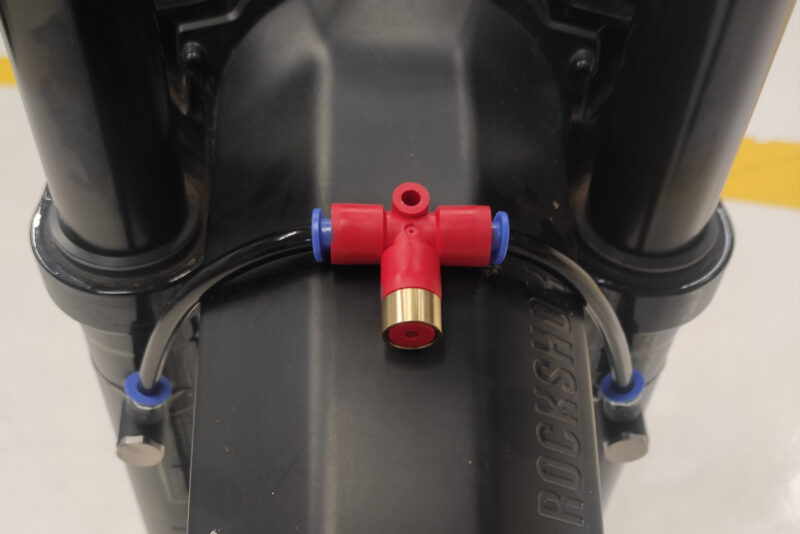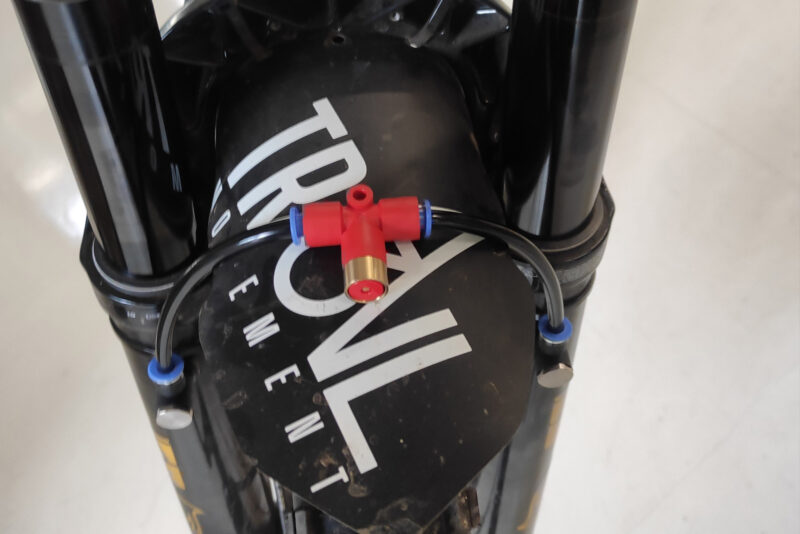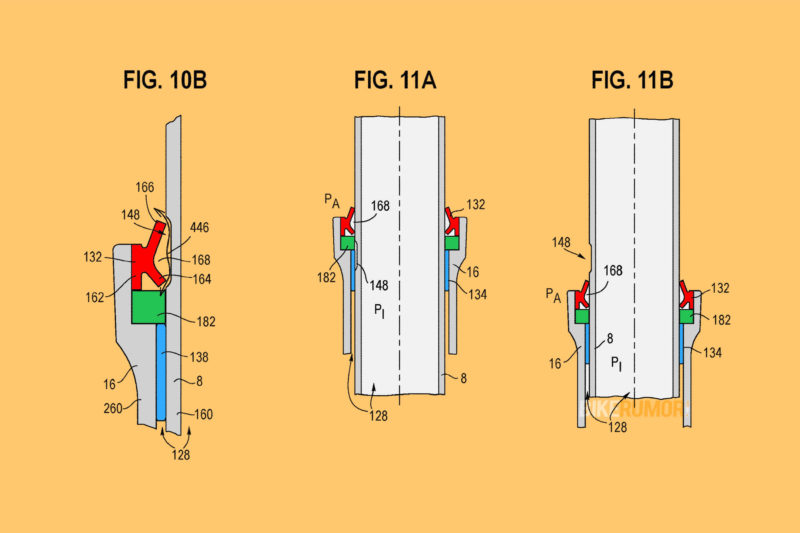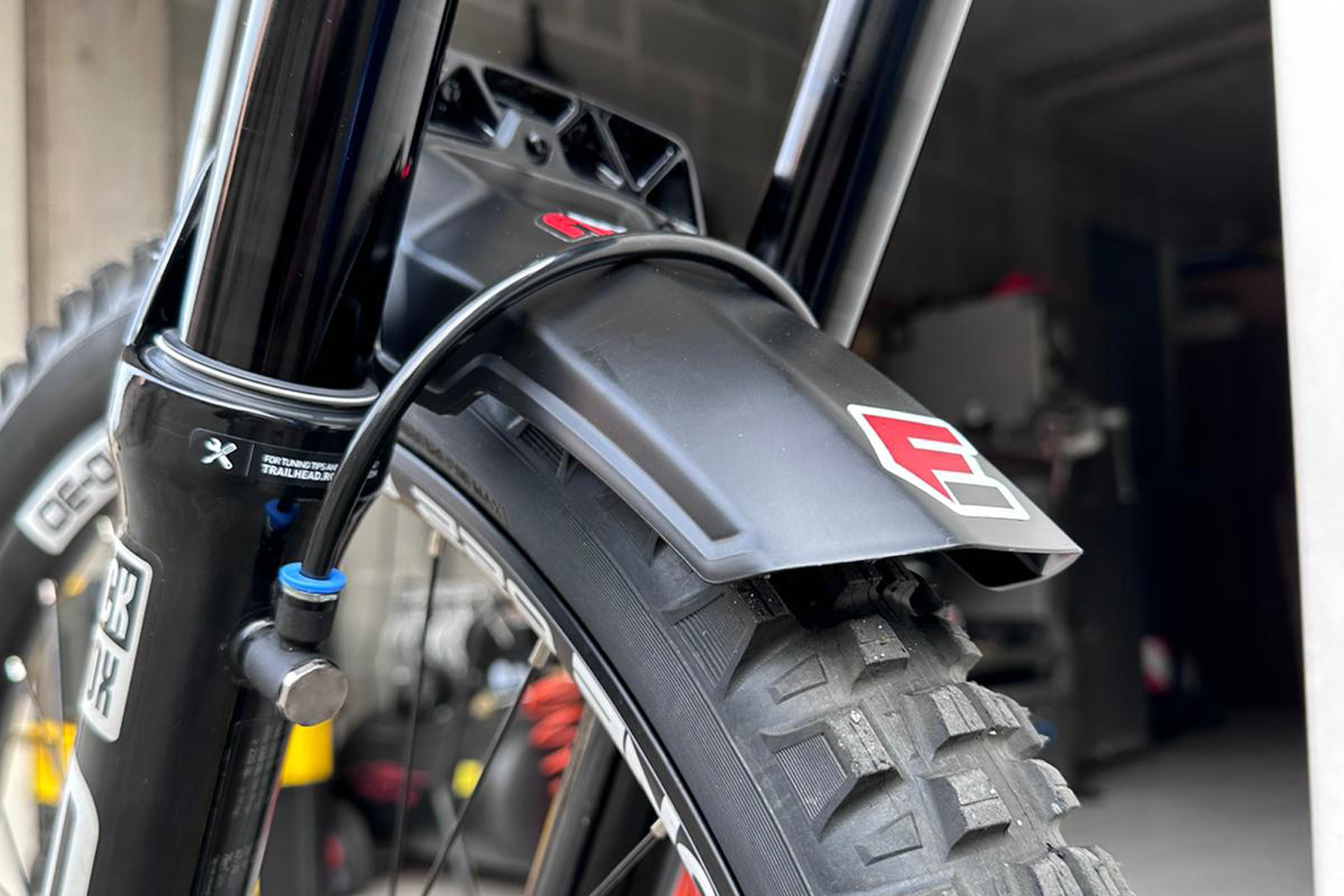EverFlow is a small Italian manufacturer of suspension enhancing components, designed by ex motocross rider, now mountain biker, Andrea Bafo. His latest creation looks to reduce the aggressive ramp exhibited by some long-travel forks. By creating a connection between the lower legs of the fork, allowing air to pass freely between the two, Andrea has been able to reduce the progressivity of RockShox and Fox forks. The solution makes use of their pressure relief valves, or bleed valves.
Happily, Andrea has commercialized the solution as the EverFlow AirLink. Anyone having trouble making full use of their fork’s travel, despite having removed all of its tokens, may want to take note.

EverFlow AirLink
Andrea Bafo turned to mountain biking after almost a decade of racing motocross. Safe to say, he was less than satisfied with the performance of suspension components designed for mountain bikes. In particular, he took issue with the aggressive end-stroke ramp exhibited by some longer travel forks, particularly those made by RockShox.
If you find yourself questioning that, go ahead and let all the air out of your air spring, then try to bottom out your fork. You may find it’s not as easy as you had imagined. Please record your pressure before you do this…
Andrea set about designing a solution that would help more riders access full travel. To do that, he needed to reduce the build up of pressure that occurs in the lower legs as the fork is pushed into compression.
The spring side suffers more from this pressure build up, thanks to the presence of the seal head on the air piston. Andrea took a bunch of forks from RockShox and Fox and drilled a hole in each lower leg to allow a measurement to be taken of the pressure inside the lower leg at bottom out. Invariably, the pressure build up in the air spring side was markedly higher than the pressure build on the damper side.
Here’s where the EverFlow AirLink comes in. By coupling the air volume of the lower legs, Andrea was able to reduce the overall pressure build up at bottom-out. The result? It requires less force to bottom-out the fork with the AirLink installed, than without it.
How does it work?
The following videos provided by Andrea look to demonstrate that. The video on the left shows what happens inside a standard air spring fork, with pressure build up in the lowers depicted by color change. The video on the right shows what happens to pressure build up in the lowers with the EverFlow AirLink installed.
Video Credit: @mtbprogress
Andrea’s Instagram stories provide excellent commentary on this. On the 180mm travel RockShox Zeb Select, for example, the damper side lower leg measured 12 PSI at bottom out, while the air spring side measured 46 PSI at bottom out. Coupling the two with the AirLink makes the compression curve more linear by reducing that pressure to just 20 PSI. Theoretically, it should allow riders to increase the pressure in the air spring to get more mid-stroke support (and rebound speed), while still allowing them to access full travel.
Happily, the EverFlow AirLink does not require anyone to drill holes in their £1,000 fork. It simply makes use of the Pressure Relief Valves on RockShox forks, and the Bleed Valves on Fox forks. To install, you’ll need to unscrew the original plugs, and screw in the AirLink fittings.
EverFlow do say that there is less of an advantage to be had with the Fox 38 fork versus the RockShox Zeb fork, as it exhibits relatively reduced lower leg ramp, as standard.

Finally, it looks as though World Cup DH racers are taking notice of EverFlow, too. Young Luca Thurlow has been testing it out at Dyfi Bike Park this week, with the help of Downamics Racing Performance.
Can Pressure Build Up in the Lowers Be Eliminated Entirely?
Yes.
It looks like EverFlow has also developed “breather valves” to connect to the pressure relief valves. These allow air to flow freely between the inside of the lower legs, and the outside of the fork, maintaining it at atmospheric pressure. That eliminates any pressure build up in the lowers. In the compression phase, air is pushed out, and in the rebound phase, air is sucked back in again.

Actually, the idea is very similar to the automatic venting system described in a recent SRAM patent. Of course, the major downside to such a solution is the risk of contamination. If air can pass freely, then it stands to reason that water and grime could, too. Andrea is not commercializing his “breather valves” for this very reason.
Pricing & Availability
The EverFlow AirLink is yours for €25. For €50, EverFlow will provide the AirLink with a pressure relief button that will allow the rider to relieve pressure from both legs simultaneously.

